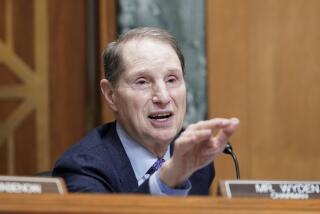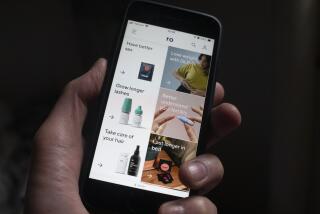Column: Alexa may be key to Amazon’s looming domination of the healthcare market
- Share via
Alexa, how do I become a healthcare player?
Amazon announced its latest move in this direction last week by introducing a feature that allows British users of its Alexa digital assistant to ask for medical advice, with answers provided by Britain’s National Health Service. For example: “Alexa, how do I treat a migraine?”
American Alexa users already can receive general health information from the likes of WebMD and the Mayo Clinic. But Amazon’s deal with Britain’s state-run NHS appears to be more treatment-oriented, and raises the possibility of similar U.S. tie-ups with Medicare, private insurers or hospital chains.
The NHS partnership also highlights Amazon’s unique position in being able to collect sensitive medical information from Alexa users and to act on such data as the world’s e-commerce leader.
This is, to put it simply, new territory.
“It’s the brave new world of unimagined consequences of new technologies,” said Anita Cava, a law professor at the University of Miami.
She told me the Health Insurance Portability and Accountability Act, aka HIPAA, the federal medical-privacy law passed in 1996, never anticipated a scenario in which people would willingly disclose confidential medical information to a private company via a voice-activated computer in their living room.
“HIPAA doesn’t apply to Amazon in this situation,” she said. “Amazon has no relationship with Alexa users as a healthcare provider. The company theoretically could do almost anything with that information.”
Which raises the key question: What could it do?
An Amazon spokeswoman in Britain, requesting that her name be withheld, said of the NHS deal that “all information is treated with high confidentiality.”
“Amazon is not sharing any of this information with third parties,” she told me, “nor is it selling products or making product recommendations based on this health information, nor is it building a health profile on customers.”
Not yet anyway.
Many observers say it’s just a matter of time before data-driven Amazon starts exploiting this treasure trove of medical information from Alexa users for business purposes.
“I expect this will contribute to Amazon’s growing share of the healthcare marketplace,” said Jodyn Platt, an assistant professor of learning health sciences at the University of Michigan.
Amazon last year purchased a San Francisco-based online pharmacy called PillPack. Since then, PillPack’s mail-order facilities nationwide have obtained licenses to sell in most states.
Wall Street analysts have speculated that Amazon aims to gain experience with online drug sales by first meeting the healthcare needs of the company’s hundreds of thousands of employees. Then it will start filling prescriptions for its millions of U.S. customers.
Does anyone really think Amazon’s chief executive, Jeff Bezos, would ignore valuable health data pouring into his company’s servers from Alexa users?
“Jeff Bezos is not a do-gooder,” the University of Miami’s Cava said. “He’s an entrepreneur. This is what he does.”
Britain’s NHS, the country’s main healthcare provider, says its link to Alexa can provide fast answers to questions such as “Alexa, what are the symptoms of chicken pox?”
That sounds relatively benign. Now consider the possible ramifications of questions such as “Alexa, what are the warning signs of a heart attack?” or “Alexa, how do I get my diabetic blood sugar under control?”
Or “Alexa, how do I know if I have hepatitis?”
Or “Alexa, how do I know if I’m mentally ill?”
Such questions — and the possible conditions they reveal — would very much be of interest to insurers and employers.
They also would be prized by what soon may be the world’s largest drugstore.
“This is powerful information we’re talking about,” said Craig Klugman, a professor of health science at DePaul University. “Personally, I would never share such information with an intelligent voice system. I wouldn’t trust it.”
I asked the Amazon spokeswoman if the company intends to use information gleaned from user questions in Britain for possible online drug sales.
“There are no plans to do that,” she replied — an answer that doesn’t quite reject such a prospect.
Kerry Hall, an Amazon spokeswoman based at the company’s Seattle headquarters, said of the NHS arrangement that “we’re always looking for ways to add more information to Alexa’s knowledge graph, and this is just another example of that.”
She declined to answer my questions about whether a similar deal could be cut with Medicare or other U.S. healthcare entities.
She also declined to address how such data could play into an Amazon online pharmacy.
The U.S. healthcare industry has been characterized for years by relentless consolidation. One recent development has been increasingly cozy ties between insurers and drugstores as a way to address soaring pharmaceutical costs.
CVS Health’s acquisition last year of insurance giant Aetna suggests a road map for how Bezos may want to enhance Amazon’s reputation for one-stop shopping.
In the same way that he promotes Amazon Prime — happy Prime Day everyone! — as a way to keep customers monogamous, why wouldn’t Bezos want to enhance the value of an Amazon online pharmacy by offering Prime Health Coverage as a way to offer customers additional savings?
“I could see Amazon using the information to target advertising that would steer customers to its own new pharmacy venture,” said Platt at the University of Michigan. “Amazon could also share the information it gets from Alexa Health for targeted advertising by third parties in the same way it currently uses personal information.”
Google and Facebook track your every move on their sites. They use that data to learn as much as they can about you in hopes of making you more attractive to marketers. Amazon does this as well.
Even if Amazon didn’t share users’ health information with others, it’s hard to imagine the company wouldn’t try to wring as much revenue as possible from it for its own ventures.
What responsibilities would accompany such efforts? That’s unclear.
What would Amazon do, for example, if an Alexa user revealed suicidal tendencies or being a victim of abuse? Would the company alert authorities? Would it decide this was none of its business?
Amazon workers listen to recordings of Alexa users to improve the technology’s speech-recognition capabilities.
“Sometimes they hear recordings they find upsetting, or possibly criminal,” Bloomberg reported. “Two of the workers said they picked up what they believe was a sexual assault.”
The workers told the news service that after they requested guidance from the company in such cases, “they were told it wasn’t Amazon’s job to interfere.”
As Cava said, this is brave-new-world stuff. Eventually, lawmakers will have to bring privacy laws into the digital age to address unanticipated uses of medical information.
For right now, all we can do is watch how Amazon’s healthcare plans play out.
And keep in mind that, for all its awesomeness, this is a company that has never hesitated to ruthlessly dominate any market it enters.
David Lazarus’ column runs Tuesdays and Fridays. He also can be seen daily on KTLA-TV Channel 5 and followed on Twitter @Davidlaz. Send your tips or feedback to [email protected].
More to Read
Inside the business of entertainment
The Wide Shot brings you news, analysis and insights on everything from streaming wars to production — and what it all means for the future.
You may occasionally receive promotional content from the Los Angeles Times.











